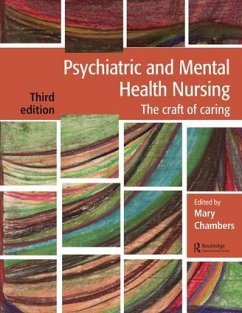Psychiatric and Mental Health Nursing
The craft of caring
Herausgeber: Chambers, Mary
Psychiatric and Mental Health Nursing
The craft of caring
Herausgeber: Chambers, Mary
- Broschiertes Buch
- Merkliste
- Auf die Merkliste
- Bewerten Bewerten
- Teilen
- Produkt teilen
- Produkterinnerung
- Produkterinnerung
This new edition of a bestselling, evidence-based textbook provides a comprehensive overview of psychiatric and mental health nursing. Always keeping patients and their recovery at the center of care and with service user perspectives integrated throughout, the holistic approach will help nurses to gain the tools and understanding required to work in this complex area.
Andere Kunden interessierten sich auch für
![Mental Health Across the Lifespan Mental Health Across the Lifespan]() Mental Health Across the Lifespan48,99 €
Mental Health Across the Lifespan48,99 €![Contemporary Mental Health Contemporary Mental Health]() Barbara FawcettContemporary Mental Health55,99 €
Barbara FawcettContemporary Mental Health55,99 €![Psychiatric Mental Health Assessment and Diagnosis of Adults for Advanced Practice Mental Health Nurses Psychiatric Mental Health Assessment and Diagnosis of Adults for Advanced Practice Mental Health Nurses]() Kunsook S. BernsteinPsychiatric Mental Health Assessment and Diagnosis of Adults for Advanced Practice Mental Health Nurses42,99 €
Kunsook S. BernsteinPsychiatric Mental Health Assessment and Diagnosis of Adults for Advanced Practice Mental Health Nurses42,99 €![Uncommon Psychiatric Syndromes Uncommon Psychiatric Syndromes]() David EnochUncommon Psychiatric Syndromes58,99 €
David EnochUncommon Psychiatric Syndromes58,99 €![Cognitive Behaviour Therapy for Acute Inpatient Mental Health Units Cognitive Behaviour Therapy for Acute Inpatient Mental Health Units]() Cognitive Behaviour Therapy for Acute Inpatient Mental Health Units64,99 €
Cognitive Behaviour Therapy for Acute Inpatient Mental Health Units64,99 €![Varcarolis' Manual of Psychiatric Nursing Care Varcarolis' Manual of Psychiatric Nursing Care]() Margaret Jordan HalterVarcarolis' Manual of Psychiatric Nursing Care61,99 €
Margaret Jordan HalterVarcarolis' Manual of Psychiatric Nursing Care61,99 €![Insane Society: A Sociology of Mental Health Insane Society: A Sociology of Mental Health]() Peter MorrallInsane Society: A Sociology of Mental Health46,99 €
Peter MorrallInsane Society: A Sociology of Mental Health46,99 €-
-
-
This new edition of a bestselling, evidence-based textbook provides a comprehensive overview of psychiatric and mental health nursing. Always keeping patients and their recovery at the center of care and with service user perspectives integrated throughout, the holistic approach will help nurses to gain the tools and understanding required to work in this complex area.
Hinweis: Dieser Artikel kann nur an eine deutsche Lieferadresse ausgeliefert werden.
Hinweis: Dieser Artikel kann nur an eine deutsche Lieferadresse ausgeliefert werden.
Produktdetails
- Produktdetails
- Verlag: Apple Academic Press Inc.
- 3 ed
- Seitenzahl: 846
- Erscheinungstermin: 20. März 2017
- Englisch
- Abmessung: 279mm x 217mm x 45mm
- Gewicht: 2396g
- ISBN-13: 9781482221954
- ISBN-10: 1482221950
- Artikelnr.: 47812815
- Herstellerkennzeichnung
- Libri GmbH
- Europaallee 1
- 36244 Bad Hersfeld
- gpsr@libri.de
- Verlag: Apple Academic Press Inc.
- 3 ed
- Seitenzahl: 846
- Erscheinungstermin: 20. März 2017
- Englisch
- Abmessung: 279mm x 217mm x 45mm
- Gewicht: 2396g
- ISBN-13: 9781482221954
- ISBN-10: 1482221950
- Artikelnr.: 47812815
- Herstellerkennzeichnung
- Libri GmbH
- Europaallee 1
- 36244 Bad Hersfeld
- gpsr@libri.de
Mary Chambers, Kingston University and St.George's University of London Joint Faculty, UK
Section 1: Aspects of mental health nursing
1 The nature of mental health nursing Ben Thomas
2 Ethics and mental health nursing Vince Mitchell
3 Developing and maintaining therapeutic relationships Rosie Stenhouse and
Chrys Muirhead
4 The politics, care and confinement of the mentally ill Liam Clarke
5 Generating nursing knowledge Tim Thornton, David Crepaz-Keay, Sebastian
Birch and Jan Verhaegh
6 Evidence-based practice in mental health care Hugh McKenna
7 Building practice from research Joanne McDonnell and Philip Cooper
8 Nursing classification and care planning Kay Jansen, Amy Coenen and
Nicholas R. Hardiker
9 Spirituality, nursing and mental health Sarah Gibson and John Swinton
10 Clinical supervision John R. Cutcliffe
11 Critical reflection Jan Fook, Jane Royes and Anthony White
Section 2: The foundations of mental health nursing
12 Classification of mental illness David Kingdon and Shanaya Rathod
13 Assessment: the key to effective practice Tony Warne, Sue McAndrew and
Fiona Jones
14 The nature and types of assessment Paul Fallon and G~
15 Conducting a family assessment Catherine Gamble, Christine Lewis, John
Baker and Ruth Allan
16 Assessing risk of suicide and self-harm Keith Waters and Alys Cole-King
17 Engagement and observation of people at risk Fiona Nolan, Caren Watson
and Mary Ellen Khoo
18 Freedom and consent Helen Leigh-Phippard and Alec Grant
19 What does it mean to have a diagnosis of mental illness? Kati Turner
Section 3: Caring for those experiencing mental health distress
20 The person who experiences anxiety Eimear Muir-Cochrane, Deb O'Kane and
Kylie Harrison
21 The person who experiences depression Ian Beech
22 The person who self-harms Jane Bunclark and Louise Stone
23 The person who is suicidal Vanessa Gordon, Karen James, Marion Janner,
Kirsten Windfuhr and Isabelle M. Hunt
24 The person experiencing schizophrenia Janet Wood, Niall McLaughlin and
Warwick Owen
25 The person who is extremely distressed and disturbed Joy Duxbury and
Fiona Jones
26 The person experiencing bipolar disorder Sally Hardy with Anonymous
27 The person with a personality disorder Christopher Alec Gordon
28 The person experiencing disturbing voices, ideas and beliefs Cheryl
Forchuk, Elsabeth Jensen and Natalie Farquhar
29 The person with experience of sexual abuse Roxane Agnew-Davies and
Phoebe
30 The person with an eating disorder Gillian Todd and Rosemary Marston
31 The person experiencing mental health and substance misuse problems
Philip A. Cooper and Graham Naughton
32 Sexuality and gender Agnes Higgins and L. Brosnan
33 The person with dementia Julia Wood
Section 4: Care planning and approaches to therapeutic practice
34 Admission of a person in acute distress Angus Forsyth and Marion Janner
35 What does the recovery approach really mean? Julie Repper and Rachel
Perkins
36 The recovery approach and risk management Jessica Holley and Dean
Pearsey
37 Using the Care Programme Approach Martin Ward
38 Providing culturally safe care Anthony O'Brien, Ruth De Souza and Maria
Baker
39 Motivational interviewing Elizabeth Hughes
40 Cognitive behaviour therapy (CBT) Lina Gega
41 Using solution-focused approaches Simon Proudlock and Sonia Sanghvi
42 Psychodynamic approaches with individuals Angela Cotton and Dina
Poursanidou
43 Psychodynamic approaches to working in groups Antony Froggett
44 Mindfulness Mary E. Campbell and Laura Burke
45 Early intervention in psychosis Henrietta Mbeah-Bankas
46 Crisis assessment and resolution Julie Taylor, Mrs M, Mr M and Miss M
47 Psychopharmacology and mental health Carl Holvey and Nikola Nikoli¿
48 Psychopharmacology in clinical practice Steve Hemmingway and Rebecca
Burgess-Dawson
Section 5: Services and support for those with mental health distress
49 What does it mean to be a carer for someone with a mental health
problem? Georgina Wakefield and Gary Hickey
50 Collaborative care planning with service users and carers Douglas
Hamandishe and Daniel Barrett
51 Family involvement and support networks Martin Atchison, Jeanette
Partridge and Jo Twiss
52 The liaison psychiatric service Katherine Chartres, Sarah Eales and
Albert Rikke
53 The acute care setting Angela Simpson, Rob Allison and Ruth Lambley
54 The psychiatric intensive care unit Christopher Dzikiti and Rebecca
Lingard
55 Mental health nursing in community care Denis Ryan and Jane Alexander
56 Assertive outreach Paul Veitch, Lisa Strong and Nicola Armstrong
57 Therapeutic communities Simon Clarke, Gary Winship, Jenelle Clarke and
Nick Manning
58 Services for children and young people Steven Pryjmachuk with Hannah
Welsby
59 Group treatments with adolescents Gemma Trainor
60 Services for individuals with both a learning disability and a mental
health disorder Chris Knifton, Richard Postance and Dorothy Hemel
61 Bereavement and grief counselling Hugh Palmer
62 The nurse's role in the administration of ECT Joy Bray and Jeannette
Harding
63 Services for people requiring secure forms of care Michael McKeown, Ian
Callaghan and Fiona Edgar
64 Services for older people with mental health problems Helen Pusey and
John Keady
65 Services for women Ann Jackson and Jessica Worner-Rodger
66 Services for refugees and asylum seekers Nicholas Procter, Monika
Ferguson, Amy Baker and Asma Babakarkhil
Section 6: Mental health nursing in the twenty-first century
67 Mental health, the law and human rights Michael Hazelton and Peter
Morrall
68 The political landscape of mental health care Dawn Freshwater
69 Physical health care Louise Howard
70 Mental health promotion Thomas Currid and Carl Chandra
71 Nursing metrics and mental health nursing Mary Chambers and Sarah
Markham
72 Health care technology and mental health nursing Maritta Välimäki
73 Mental health nursing in the twenty-first century Patrick Callaghan and
Debbie Butler
1 The nature of mental health nursing Ben Thomas
2 Ethics and mental health nursing Vince Mitchell
3 Developing and maintaining therapeutic relationships Rosie Stenhouse and
Chrys Muirhead
4 The politics, care and confinement of the mentally ill Liam Clarke
5 Generating nursing knowledge Tim Thornton, David Crepaz-Keay, Sebastian
Birch and Jan Verhaegh
6 Evidence-based practice in mental health care Hugh McKenna
7 Building practice from research Joanne McDonnell and Philip Cooper
8 Nursing classification and care planning Kay Jansen, Amy Coenen and
Nicholas R. Hardiker
9 Spirituality, nursing and mental health Sarah Gibson and John Swinton
10 Clinical supervision John R. Cutcliffe
11 Critical reflection Jan Fook, Jane Royes and Anthony White
Section 2: The foundations of mental health nursing
12 Classification of mental illness David Kingdon and Shanaya Rathod
13 Assessment: the key to effective practice Tony Warne, Sue McAndrew and
Fiona Jones
14 The nature and types of assessment Paul Fallon and G~
15 Conducting a family assessment Catherine Gamble, Christine Lewis, John
Baker and Ruth Allan
16 Assessing risk of suicide and self-harm Keith Waters and Alys Cole-King
17 Engagement and observation of people at risk Fiona Nolan, Caren Watson
and Mary Ellen Khoo
18 Freedom and consent Helen Leigh-Phippard and Alec Grant
19 What does it mean to have a diagnosis of mental illness? Kati Turner
Section 3: Caring for those experiencing mental health distress
20 The person who experiences anxiety Eimear Muir-Cochrane, Deb O'Kane and
Kylie Harrison
21 The person who experiences depression Ian Beech
22 The person who self-harms Jane Bunclark and Louise Stone
23 The person who is suicidal Vanessa Gordon, Karen James, Marion Janner,
Kirsten Windfuhr and Isabelle M. Hunt
24 The person experiencing schizophrenia Janet Wood, Niall McLaughlin and
Warwick Owen
25 The person who is extremely distressed and disturbed Joy Duxbury and
Fiona Jones
26 The person experiencing bipolar disorder Sally Hardy with Anonymous
27 The person with a personality disorder Christopher Alec Gordon
28 The person experiencing disturbing voices, ideas and beliefs Cheryl
Forchuk, Elsabeth Jensen and Natalie Farquhar
29 The person with experience of sexual abuse Roxane Agnew-Davies and
Phoebe
30 The person with an eating disorder Gillian Todd and Rosemary Marston
31 The person experiencing mental health and substance misuse problems
Philip A. Cooper and Graham Naughton
32 Sexuality and gender Agnes Higgins and L. Brosnan
33 The person with dementia Julia Wood
Section 4: Care planning and approaches to therapeutic practice
34 Admission of a person in acute distress Angus Forsyth and Marion Janner
35 What does the recovery approach really mean? Julie Repper and Rachel
Perkins
36 The recovery approach and risk management Jessica Holley and Dean
Pearsey
37 Using the Care Programme Approach Martin Ward
38 Providing culturally safe care Anthony O'Brien, Ruth De Souza and Maria
Baker
39 Motivational interviewing Elizabeth Hughes
40 Cognitive behaviour therapy (CBT) Lina Gega
41 Using solution-focused approaches Simon Proudlock and Sonia Sanghvi
42 Psychodynamic approaches with individuals Angela Cotton and Dina
Poursanidou
43 Psychodynamic approaches to working in groups Antony Froggett
44 Mindfulness Mary E. Campbell and Laura Burke
45 Early intervention in psychosis Henrietta Mbeah-Bankas
46 Crisis assessment and resolution Julie Taylor, Mrs M, Mr M and Miss M
47 Psychopharmacology and mental health Carl Holvey and Nikola Nikoli¿
48 Psychopharmacology in clinical practice Steve Hemmingway and Rebecca
Burgess-Dawson
Section 5: Services and support for those with mental health distress
49 What does it mean to be a carer for someone with a mental health
problem? Georgina Wakefield and Gary Hickey
50 Collaborative care planning with service users and carers Douglas
Hamandishe and Daniel Barrett
51 Family involvement and support networks Martin Atchison, Jeanette
Partridge and Jo Twiss
52 The liaison psychiatric service Katherine Chartres, Sarah Eales and
Albert Rikke
53 The acute care setting Angela Simpson, Rob Allison and Ruth Lambley
54 The psychiatric intensive care unit Christopher Dzikiti and Rebecca
Lingard
55 Mental health nursing in community care Denis Ryan and Jane Alexander
56 Assertive outreach Paul Veitch, Lisa Strong and Nicola Armstrong
57 Therapeutic communities Simon Clarke, Gary Winship, Jenelle Clarke and
Nick Manning
58 Services for children and young people Steven Pryjmachuk with Hannah
Welsby
59 Group treatments with adolescents Gemma Trainor
60 Services for individuals with both a learning disability and a mental
health disorder Chris Knifton, Richard Postance and Dorothy Hemel
61 Bereavement and grief counselling Hugh Palmer
62 The nurse's role in the administration of ECT Joy Bray and Jeannette
Harding
63 Services for people requiring secure forms of care Michael McKeown, Ian
Callaghan and Fiona Edgar
64 Services for older people with mental health problems Helen Pusey and
John Keady
65 Services for women Ann Jackson and Jessica Worner-Rodger
66 Services for refugees and asylum seekers Nicholas Procter, Monika
Ferguson, Amy Baker and Asma Babakarkhil
Section 6: Mental health nursing in the twenty-first century
67 Mental health, the law and human rights Michael Hazelton and Peter
Morrall
68 The political landscape of mental health care Dawn Freshwater
69 Physical health care Louise Howard
70 Mental health promotion Thomas Currid and Carl Chandra
71 Nursing metrics and mental health nursing Mary Chambers and Sarah
Markham
72 Health care technology and mental health nursing Maritta Välimäki
73 Mental health nursing in the twenty-first century Patrick Callaghan and
Debbie Butler
Section 1: Aspects of mental health nursing
1 The nature of mental health nursing Ben Thomas
2 Ethics and mental health nursing Vince Mitchell
3 Developing and maintaining therapeutic relationships Rosie Stenhouse and
Chrys Muirhead
4 The politics, care and confinement of the mentally ill Liam Clarke
5 Generating nursing knowledge Tim Thornton, David Crepaz-Keay, Sebastian
Birch and Jan Verhaegh
6 Evidence-based practice in mental health care Hugh McKenna
7 Building practice from research Joanne McDonnell and Philip Cooper
8 Nursing classification and care planning Kay Jansen, Amy Coenen and
Nicholas R. Hardiker
9 Spirituality, nursing and mental health Sarah Gibson and John Swinton
10 Clinical supervision John R. Cutcliffe
11 Critical reflection Jan Fook, Jane Royes and Anthony White
Section 2: The foundations of mental health nursing
12 Classification of mental illness David Kingdon and Shanaya Rathod
13 Assessment: the key to effective practice Tony Warne, Sue McAndrew and
Fiona Jones
14 The nature and types of assessment Paul Fallon and G~
15 Conducting a family assessment Catherine Gamble, Christine Lewis, John
Baker and Ruth Allan
16 Assessing risk of suicide and self-harm Keith Waters and Alys Cole-King
17 Engagement and observation of people at risk Fiona Nolan, Caren Watson
and Mary Ellen Khoo
18 Freedom and consent Helen Leigh-Phippard and Alec Grant
19 What does it mean to have a diagnosis of mental illness? Kati Turner
Section 3: Caring for those experiencing mental health distress
20 The person who experiences anxiety Eimear Muir-Cochrane, Deb O'Kane and
Kylie Harrison
21 The person who experiences depression Ian Beech
22 The person who self-harms Jane Bunclark and Louise Stone
23 The person who is suicidal Vanessa Gordon, Karen James, Marion Janner,
Kirsten Windfuhr and Isabelle M. Hunt
24 The person experiencing schizophrenia Janet Wood, Niall McLaughlin and
Warwick Owen
25 The person who is extremely distressed and disturbed Joy Duxbury and
Fiona Jones
26 The person experiencing bipolar disorder Sally Hardy with Anonymous
27 The person with a personality disorder Christopher Alec Gordon
28 The person experiencing disturbing voices, ideas and beliefs Cheryl
Forchuk, Elsabeth Jensen and Natalie Farquhar
29 The person with experience of sexual abuse Roxane Agnew-Davies and
Phoebe
30 The person with an eating disorder Gillian Todd and Rosemary Marston
31 The person experiencing mental health and substance misuse problems
Philip A. Cooper and Graham Naughton
32 Sexuality and gender Agnes Higgins and L. Brosnan
33 The person with dementia Julia Wood
Section 4: Care planning and approaches to therapeutic practice
34 Admission of a person in acute distress Angus Forsyth and Marion Janner
35 What does the recovery approach really mean? Julie Repper and Rachel
Perkins
36 The recovery approach and risk management Jessica Holley and Dean
Pearsey
37 Using the Care Programme Approach Martin Ward
38 Providing culturally safe care Anthony O'Brien, Ruth De Souza and Maria
Baker
39 Motivational interviewing Elizabeth Hughes
40 Cognitive behaviour therapy (CBT) Lina Gega
41 Using solution-focused approaches Simon Proudlock and Sonia Sanghvi
42 Psychodynamic approaches with individuals Angela Cotton and Dina
Poursanidou
43 Psychodynamic approaches to working in groups Antony Froggett
44 Mindfulness Mary E. Campbell and Laura Burke
45 Early intervention in psychosis Henrietta Mbeah-Bankas
46 Crisis assessment and resolution Julie Taylor, Mrs M, Mr M and Miss M
47 Psychopharmacology and mental health Carl Holvey and Nikola Nikoli¿
48 Psychopharmacology in clinical practice Steve Hemmingway and Rebecca
Burgess-Dawson
Section 5: Services and support for those with mental health distress
49 What does it mean to be a carer for someone with a mental health
problem? Georgina Wakefield and Gary Hickey
50 Collaborative care planning with service users and carers Douglas
Hamandishe and Daniel Barrett
51 Family involvement and support networks Martin Atchison, Jeanette
Partridge and Jo Twiss
52 The liaison psychiatric service Katherine Chartres, Sarah Eales and
Albert Rikke
53 The acute care setting Angela Simpson, Rob Allison and Ruth Lambley
54 The psychiatric intensive care unit Christopher Dzikiti and Rebecca
Lingard
55 Mental health nursing in community care Denis Ryan and Jane Alexander
56 Assertive outreach Paul Veitch, Lisa Strong and Nicola Armstrong
57 Therapeutic communities Simon Clarke, Gary Winship, Jenelle Clarke and
Nick Manning
58 Services for children and young people Steven Pryjmachuk with Hannah
Welsby
59 Group treatments with adolescents Gemma Trainor
60 Services for individuals with both a learning disability and a mental
health disorder Chris Knifton, Richard Postance and Dorothy Hemel
61 Bereavement and grief counselling Hugh Palmer
62 The nurse's role in the administration of ECT Joy Bray and Jeannette
Harding
63 Services for people requiring secure forms of care Michael McKeown, Ian
Callaghan and Fiona Edgar
64 Services for older people with mental health problems Helen Pusey and
John Keady
65 Services for women Ann Jackson and Jessica Worner-Rodger
66 Services for refugees and asylum seekers Nicholas Procter, Monika
Ferguson, Amy Baker and Asma Babakarkhil
Section 6: Mental health nursing in the twenty-first century
67 Mental health, the law and human rights Michael Hazelton and Peter
Morrall
68 The political landscape of mental health care Dawn Freshwater
69 Physical health care Louise Howard
70 Mental health promotion Thomas Currid and Carl Chandra
71 Nursing metrics and mental health nursing Mary Chambers and Sarah
Markham
72 Health care technology and mental health nursing Maritta Välimäki
73 Mental health nursing in the twenty-first century Patrick Callaghan and
Debbie Butler
1 The nature of mental health nursing Ben Thomas
2 Ethics and mental health nursing Vince Mitchell
3 Developing and maintaining therapeutic relationships Rosie Stenhouse and
Chrys Muirhead
4 The politics, care and confinement of the mentally ill Liam Clarke
5 Generating nursing knowledge Tim Thornton, David Crepaz-Keay, Sebastian
Birch and Jan Verhaegh
6 Evidence-based practice in mental health care Hugh McKenna
7 Building practice from research Joanne McDonnell and Philip Cooper
8 Nursing classification and care planning Kay Jansen, Amy Coenen and
Nicholas R. Hardiker
9 Spirituality, nursing and mental health Sarah Gibson and John Swinton
10 Clinical supervision John R. Cutcliffe
11 Critical reflection Jan Fook, Jane Royes and Anthony White
Section 2: The foundations of mental health nursing
12 Classification of mental illness David Kingdon and Shanaya Rathod
13 Assessment: the key to effective practice Tony Warne, Sue McAndrew and
Fiona Jones
14 The nature and types of assessment Paul Fallon and G~
15 Conducting a family assessment Catherine Gamble, Christine Lewis, John
Baker and Ruth Allan
16 Assessing risk of suicide and self-harm Keith Waters and Alys Cole-King
17 Engagement and observation of people at risk Fiona Nolan, Caren Watson
and Mary Ellen Khoo
18 Freedom and consent Helen Leigh-Phippard and Alec Grant
19 What does it mean to have a diagnosis of mental illness? Kati Turner
Section 3: Caring for those experiencing mental health distress
20 The person who experiences anxiety Eimear Muir-Cochrane, Deb O'Kane and
Kylie Harrison
21 The person who experiences depression Ian Beech
22 The person who self-harms Jane Bunclark and Louise Stone
23 The person who is suicidal Vanessa Gordon, Karen James, Marion Janner,
Kirsten Windfuhr and Isabelle M. Hunt
24 The person experiencing schizophrenia Janet Wood, Niall McLaughlin and
Warwick Owen
25 The person who is extremely distressed and disturbed Joy Duxbury and
Fiona Jones
26 The person experiencing bipolar disorder Sally Hardy with Anonymous
27 The person with a personality disorder Christopher Alec Gordon
28 The person experiencing disturbing voices, ideas and beliefs Cheryl
Forchuk, Elsabeth Jensen and Natalie Farquhar
29 The person with experience of sexual abuse Roxane Agnew-Davies and
Phoebe
30 The person with an eating disorder Gillian Todd and Rosemary Marston
31 The person experiencing mental health and substance misuse problems
Philip A. Cooper and Graham Naughton
32 Sexuality and gender Agnes Higgins and L. Brosnan
33 The person with dementia Julia Wood
Section 4: Care planning and approaches to therapeutic practice
34 Admission of a person in acute distress Angus Forsyth and Marion Janner
35 What does the recovery approach really mean? Julie Repper and Rachel
Perkins
36 The recovery approach and risk management Jessica Holley and Dean
Pearsey
37 Using the Care Programme Approach Martin Ward
38 Providing culturally safe care Anthony O'Brien, Ruth De Souza and Maria
Baker
39 Motivational interviewing Elizabeth Hughes
40 Cognitive behaviour therapy (CBT) Lina Gega
41 Using solution-focused approaches Simon Proudlock and Sonia Sanghvi
42 Psychodynamic approaches with individuals Angela Cotton and Dina
Poursanidou
43 Psychodynamic approaches to working in groups Antony Froggett
44 Mindfulness Mary E. Campbell and Laura Burke
45 Early intervention in psychosis Henrietta Mbeah-Bankas
46 Crisis assessment and resolution Julie Taylor, Mrs M, Mr M and Miss M
47 Psychopharmacology and mental health Carl Holvey and Nikola Nikoli¿
48 Psychopharmacology in clinical practice Steve Hemmingway and Rebecca
Burgess-Dawson
Section 5: Services and support for those with mental health distress
49 What does it mean to be a carer for someone with a mental health
problem? Georgina Wakefield and Gary Hickey
50 Collaborative care planning with service users and carers Douglas
Hamandishe and Daniel Barrett
51 Family involvement and support networks Martin Atchison, Jeanette
Partridge and Jo Twiss
52 The liaison psychiatric service Katherine Chartres, Sarah Eales and
Albert Rikke
53 The acute care setting Angela Simpson, Rob Allison and Ruth Lambley
54 The psychiatric intensive care unit Christopher Dzikiti and Rebecca
Lingard
55 Mental health nursing in community care Denis Ryan and Jane Alexander
56 Assertive outreach Paul Veitch, Lisa Strong and Nicola Armstrong
57 Therapeutic communities Simon Clarke, Gary Winship, Jenelle Clarke and
Nick Manning
58 Services for children and young people Steven Pryjmachuk with Hannah
Welsby
59 Group treatments with adolescents Gemma Trainor
60 Services for individuals with both a learning disability and a mental
health disorder Chris Knifton, Richard Postance and Dorothy Hemel
61 Bereavement and grief counselling Hugh Palmer
62 The nurse's role in the administration of ECT Joy Bray and Jeannette
Harding
63 Services for people requiring secure forms of care Michael McKeown, Ian
Callaghan and Fiona Edgar
64 Services for older people with mental health problems Helen Pusey and
John Keady
65 Services for women Ann Jackson and Jessica Worner-Rodger
66 Services for refugees and asylum seekers Nicholas Procter, Monika
Ferguson, Amy Baker and Asma Babakarkhil
Section 6: Mental health nursing in the twenty-first century
67 Mental health, the law and human rights Michael Hazelton and Peter
Morrall
68 The political landscape of mental health care Dawn Freshwater
69 Physical health care Louise Howard
70 Mental health promotion Thomas Currid and Carl Chandra
71 Nursing metrics and mental health nursing Mary Chambers and Sarah
Markham
72 Health care technology and mental health nursing Maritta Välimäki
73 Mental health nursing in the twenty-first century Patrick Callaghan and
Debbie Butler








